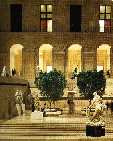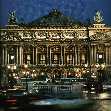(Click on photos for more information)
The Bastille was originally a fortified castle, built in 1370 by Charles V -- a military fortress to protect the Porte Saint Antoine as well as the Hotel Saint Paul, where the king resided at the time. Starting in 1382, Charles VI, who completed it, used it as a prison for dissidents. This continued over six centuries. Some of the more notable visitors at the Bastille included Voltaire and the Marquis de Sade...

The Arc de Triomphe is situated
on the Place de l’Etoile which originally was a 5-meter-high hill,
levelled in 1774. The dirt which was recovered, was used to shore up the
Champs-Elysées...

In 1670, Louis XIV commissioned an elm-lined street to be created in the marsh between the Tuileries Gardens and the present day Rond-Point. In 1710, the street was prolonged to the top of the hill where the Arc de Triomphe now stands...
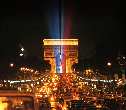
No doubt the best example of the architectural splendour of the Second Empire, the Garnier Opera is one of the largest old opera houses (11,000 square meters). Almost one hundred people can perform simultaneously on stage there, and the auditorium can hold up to 2200 spectators...
Situated on the Ile de la
Cité, Notre Dame and its parvis, were considered the center of France
-- during the Middle Ages, particularly. During the Middle Ages, the cathedral
was truly the center of a multitude of tiny commerces,
fairs ...
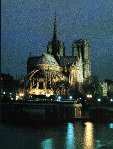
Legend has it that in the fifth century Saint Denis was beheaded on Montmartre hill, along with two of his companions, for not having renounced Christianity...
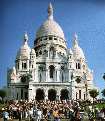
The Eiffel Tower was constructed
to commemorate the centennial of the French Revolution and also to stand
as a symbol for the Univeral Exhibition which was held in Paris in 1889...

From its beginning to the
recent construction of the Pei pyramid, the Louvre has continuously changed
shape over the course of seven hundred years. Many powerful men have left
their imprint on this Parisian monument which is now the largest art museum
in the world.
